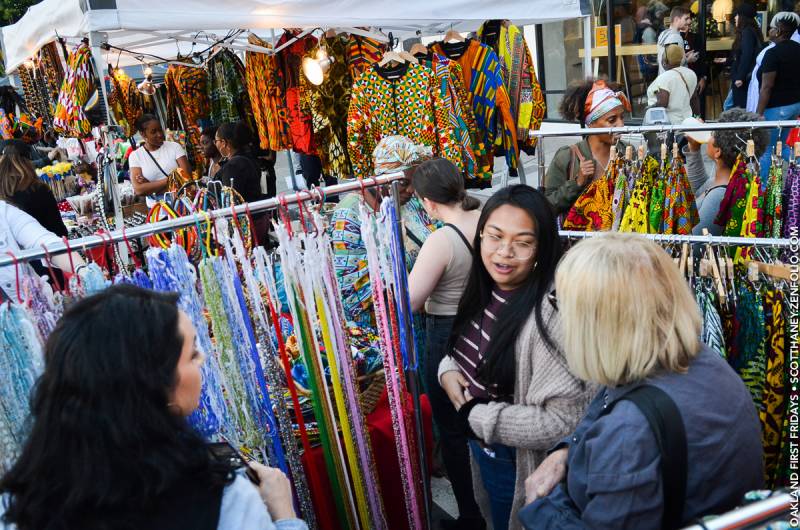Since California’s shelter-in-place orders lifted on June 15, arts events have been popping up all over the Bay Area—a welcome sight for people eager to experience some culture and artists who’ve been out of work for the past year-plus.
Yet one event that’s notably not making a comeback in the foreseeable future is Oakland First Fridays. Organizers say it’s because they can’t afford the Oakland Police Department’s security fees.
First Fridays have been a hallmark of Oakland arts and culture for years. Before the COVID-19 shutdown, the monthly art walk brought tens of thousands of attendees to Telegraph Avenue between 27th Street and West Grand Avenue, where dozens of artists, food trucks and performers would set up shop for the evening. First Fridays began as a small, renegade art party in 2006 and expanded in scope and popularity over the years, becoming one of Oakland’s biggest attractions. The monthly street fair also created jobs for security and clean-up crews, and provided an economic boost to the neighborhood’s art galleries, bars and other brick-and-mortar businesses. Organizers estimate that it raised revenues in the area by as much as 250%.
But First Fridays’ future is now in jeopardy. Shari Godinez, executive director of the Koreatown Northgate Community Benefit District (KONO), the nonprofit group that puts on First Fridays, found this out when the city told her she couldn’t get a special event permit for the anticipated July 2 relaunch unless she agreed to pay the OPD $24,000 to send 45 officers to the area. What’s more, Godinez said OPD wanted KONO to pay for patrols outside the event’s perimeter, in the nightlife-heavy lower Telegraph area. The Oakland Police Department did not return KQED’s numerous requests for comment.
Previously, Oakland’s hotel tax funded arts festivals and grants, including the cost of OPD’s time at First Fridays. But that money was depleted during the pandemic. Still, the scope of the police department’s requirements surprised Godinez. Previously, OPD never had more than five to seven officers within the perimeter of First Fridays, Godinez recalled. She’s unsure how much that would have cost, as KONO never previously had to cover the expense. But the $24,000 appears to be much higher than the security fees previous festivals in Oakland have paid. For context, public records gathered by the East Bay Express show that in 2015, OPD charged $5,000 to Burger Boogaloo, a music festival with 10,000 attendees.
Godinez says KONO does not have funding to cover the police department’s fees and called off July’s First Friday. She’s unsure if First Fridays will return in August either. She called the turn of events a missed opportunity for Oakland after over a year of shutdowns. “[The pandemic] is the biggest economic crisis in our country, and the industry impacted the most is arts and entertainment,” Godinez said. “And you’re going to say you can’t come back unless we pay $24,000?”
Oakland City Council recently approved its budget for the 2021–2023 fiscal year, which includes $674 million for the police department, or about 18% of the city’s total expenditures. Yet city officials said that, as far as covering OPD expenses at First Fridays, their hands are tied. “Hotel tax revenues were decimated by the collapse of the tourism industry during the pandemic,” Harry Hamilton, spokesperson for the Economic & Workforce Development Department, wrote in an email to KQED.
Hamilton said that after Oakland’s midcycle budget adjustment in June 2020, funding was removed from the city’s fairs and festivals account to help balance other pandemic-induced budget shortfalls. In the 2019–2020 fiscal year, that account contained $221,512. But the city’s latest five-year financial forecast projects that hotel tax revenues will not reach pre-pandemic levels for several years to come.
Meanwhile, Oakland’s budget for 2021–2023 seeks to add $1.5 million in funding for arts festivals and grants with a focus on underserved areas such as East Oakland, West Oakland, Fruitvale, San Antonio, Chinatown, Little Saigon/Eastlake, Laurel and Brookdale. But it will take months for the city to create a structure to distribute the money, and it’s unclear whether an event in the Uptown neighborhood like First Fridays will qualify.
“For these additional funds, staff anticipates returning to City Council through a Life Enrichment Committee in October with a detailed, equitable plan on how to expend these new monies,” Hamilton explained. “The current thinking is a variation of the successful Neighborhood Voices grants program with a mechanism for event and festival organizers to be able to apply for grant funds.”


